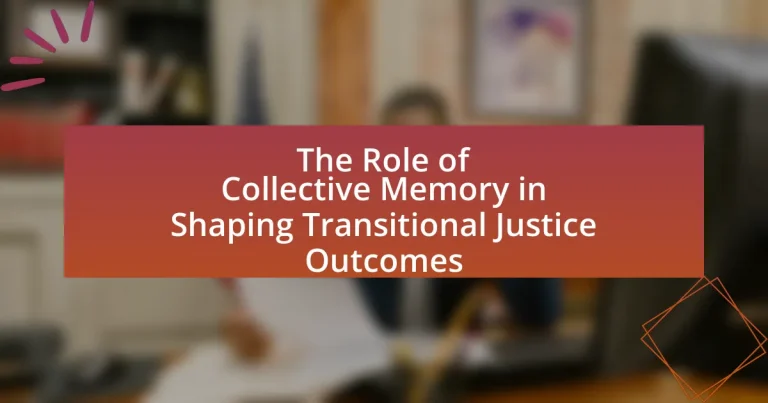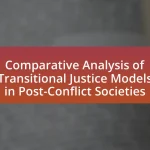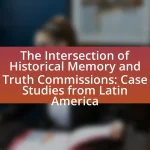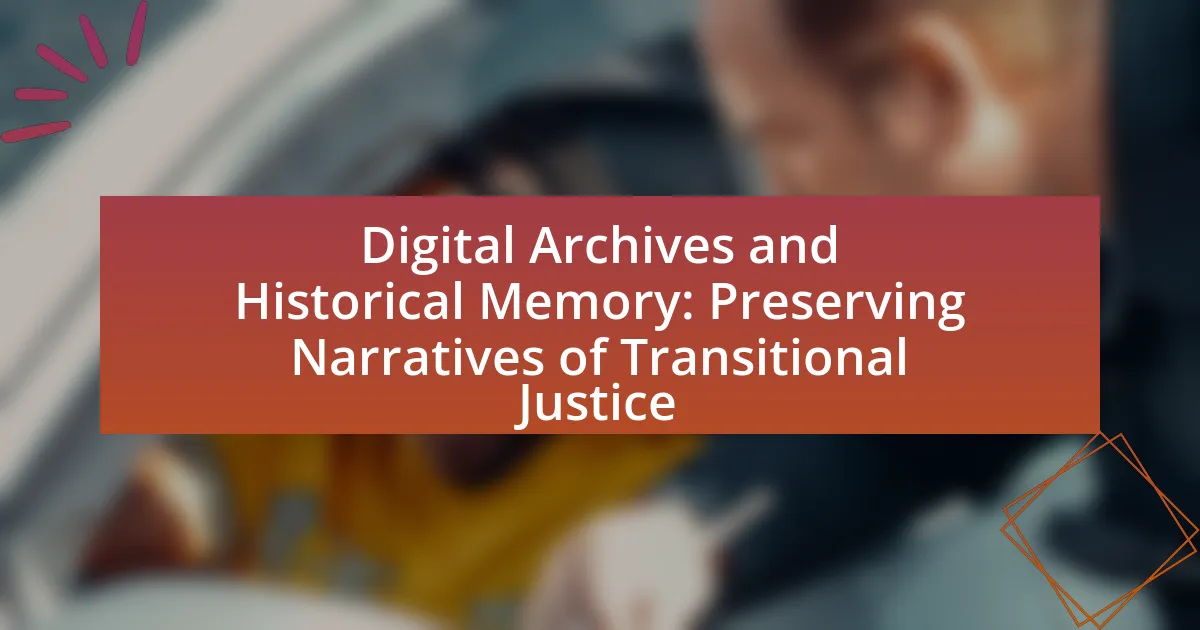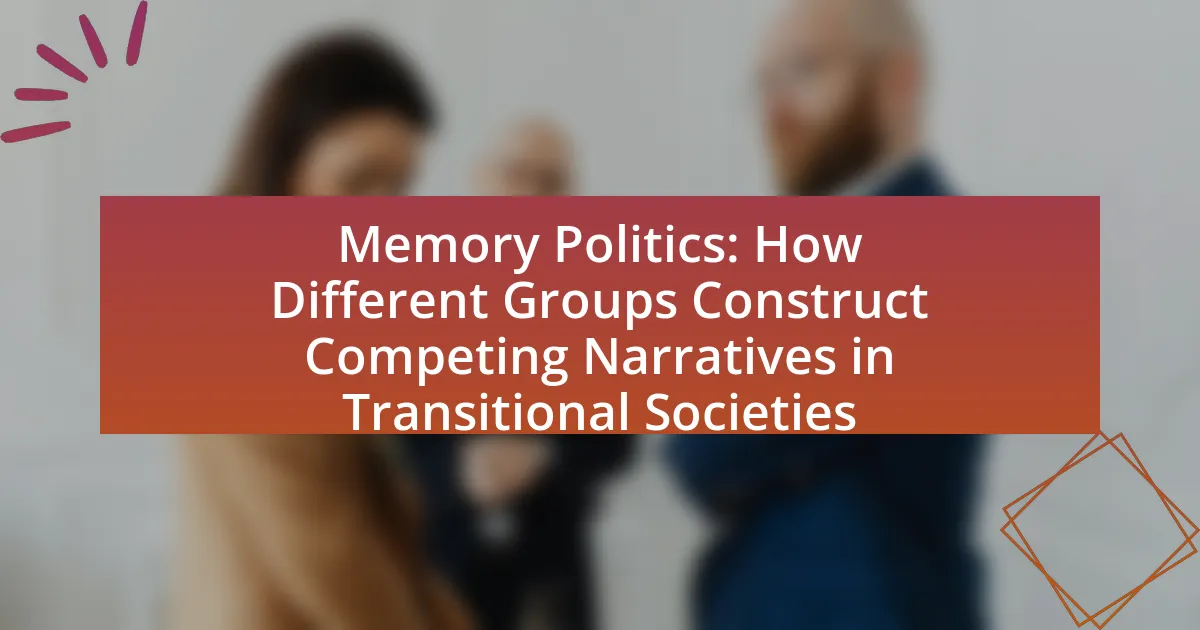The article examines the critical role of collective memory in shaping transitional justice outcomes, emphasizing its influence on societal understanding of past injustices and the processes of reconciliation and accountability. It highlights key elements such as shared narratives, historical acknowledgment, and commemoration, which contribute to societal perceptions of justice. The article also discusses how collective memory can enhance or hinder transitional justice mechanisms, the challenges posed by differing memories, and best practices for effectively engaging with collective memory in justice processes. Through case studies, particularly from post-apartheid South Africa, the article illustrates the importance of integrating collective memory into transitional justice initiatives to promote healing and legitimacy.
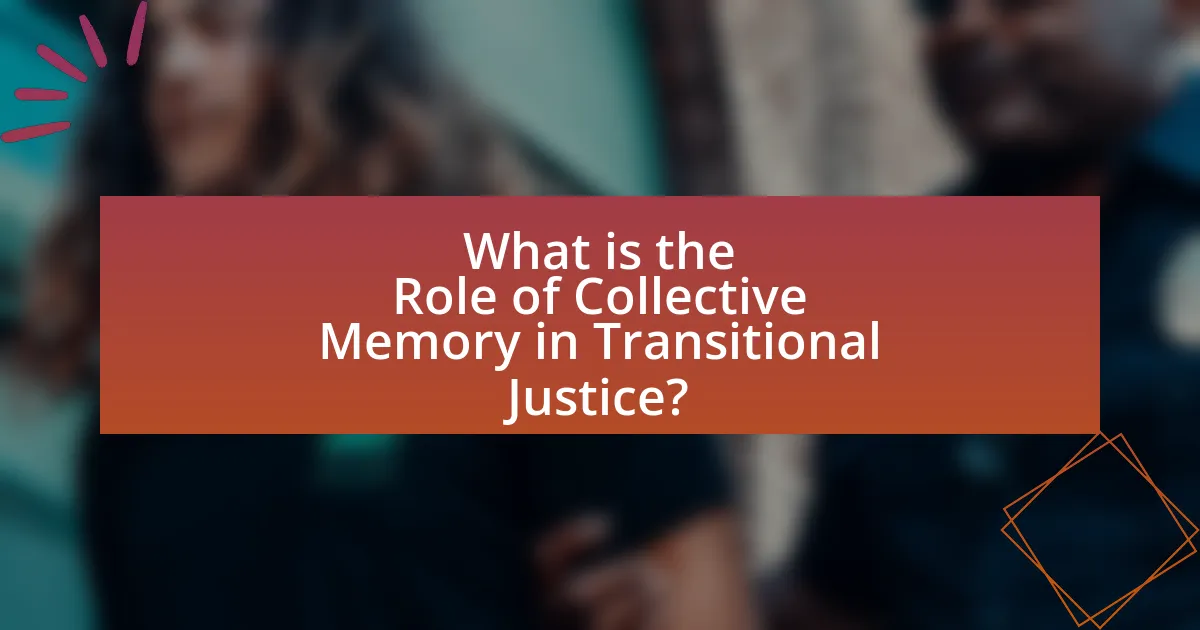
What is the Role of Collective Memory in Transitional Justice?
Collective memory plays a crucial role in transitional justice by shaping societal understanding of past injustices and influencing the processes of reconciliation and accountability. It serves as a framework through which communities remember and interpret historical events, particularly those related to conflict and human rights violations. For instance, in post-apartheid South Africa, the Truth and Reconciliation Commission utilized collective memory to address the atrocities of the past, allowing victims to share their experiences and fostering a national dialogue about healing and justice. This process not only aids in acknowledging the suffering of victims but also helps to establish a shared narrative that can guide future policies and societal norms, thereby reinforcing the legitimacy of transitional justice mechanisms.
How does collective memory influence societal perceptions of justice?
Collective memory significantly influences societal perceptions of justice by shaping how communities remember and interpret past events, particularly those involving trauma or injustice. This shared recollection can create a collective narrative that informs public opinion on justice-related issues, such as accountability for past atrocities. For instance, in post-apartheid South Africa, the Truth and Reconciliation Commission utilized collective memory to address historical injustices, fostering a societal understanding of justice that emphasized reconciliation over retribution. Research indicates that societies with a strong collective memory of injustice are more likely to demand accountability and reparations, as seen in the case of Holocaust remembrance, which has led to ongoing discussions about reparative justice. Thus, collective memory acts as a lens through which justice is perceived and pursued within a society.
What are the key elements of collective memory in the context of transitional justice?
The key elements of collective memory in the context of transitional justice include shared narratives, historical acknowledgment, and the role of commemoration. Shared narratives serve as a foundation for understanding past injustices, allowing communities to collectively process their experiences. Historical acknowledgment involves recognizing and validating the suffering endured by victims, which is essential for fostering reconciliation. The role of commemoration is significant as it helps to memorialize victims and events, ensuring that the past is not forgotten and that lessons are learned for the future. These elements collectively contribute to shaping societal attitudes towards justice and accountability, influencing the effectiveness of transitional justice mechanisms.
How does collective memory shape narratives around past injustices?
Collective memory shapes narratives around past injustices by influencing how communities remember and interpret historical events. This shared recollection affects societal perceptions, often leading to a collective understanding that can either promote healing or perpetuate division. For instance, in post-apartheid South Africa, the Truth and Reconciliation Commission utilized collective memory to address the injustices of the past, fostering a narrative that emphasized forgiveness and national unity. Research by scholars such as Paul Ricoeur highlights that collective memory not only preserves the experiences of marginalized groups but also informs contemporary social justice movements, thereby validating the importance of these narratives in shaping transitional justice outcomes.
Why is collective memory important for transitional justice outcomes?
Collective memory is crucial for transitional justice outcomes because it shapes societal understanding of past injustices and informs the processes of reconciliation and accountability. By preserving shared narratives of historical events, collective memory fosters a sense of identity and community among affected populations, which is essential for healing and rebuilding trust. Research indicates that societies that actively engage with their collective memory, such as through memorialization and education, are more likely to achieve successful transitional justice outcomes, as seen in post-apartheid South Africa where truth commissions relied on collective memory to address past atrocities and promote national unity.
What role does collective memory play in reconciliation processes?
Collective memory plays a crucial role in reconciliation processes by shaping the narratives and identities of communities affected by conflict. It influences how societies remember past injustices, which can either facilitate healing or perpetuate divisions. For instance, in post-apartheid South Africa, the Truth and Reconciliation Commission utilized collective memory to address historical grievances, allowing victims to share their experiences and fostering a shared understanding of the past. This approach helped to create a collective narrative that acknowledged suffering and promoted national unity, demonstrating that collective memory can be instrumental in building a foundation for reconciliation.
How can collective memory affect the legitimacy of transitional justice mechanisms?
Collective memory can significantly affect the legitimacy of transitional justice mechanisms by shaping public perceptions and influencing societal acceptance of these processes. When a community shares a collective memory of past injustices, it can either bolster support for transitional justice initiatives or undermine their credibility, depending on how these mechanisms align with the community’s historical narratives. For instance, if transitional justice efforts are perceived as failing to adequately address the collective memory of victims or are seen as favoring certain groups over others, this can lead to skepticism and resistance among the populace. Research indicates that successful transitional justice mechanisms often incorporate elements of collective memory, ensuring that they resonate with the experiences and expectations of affected communities, thereby enhancing their legitimacy and effectiveness.
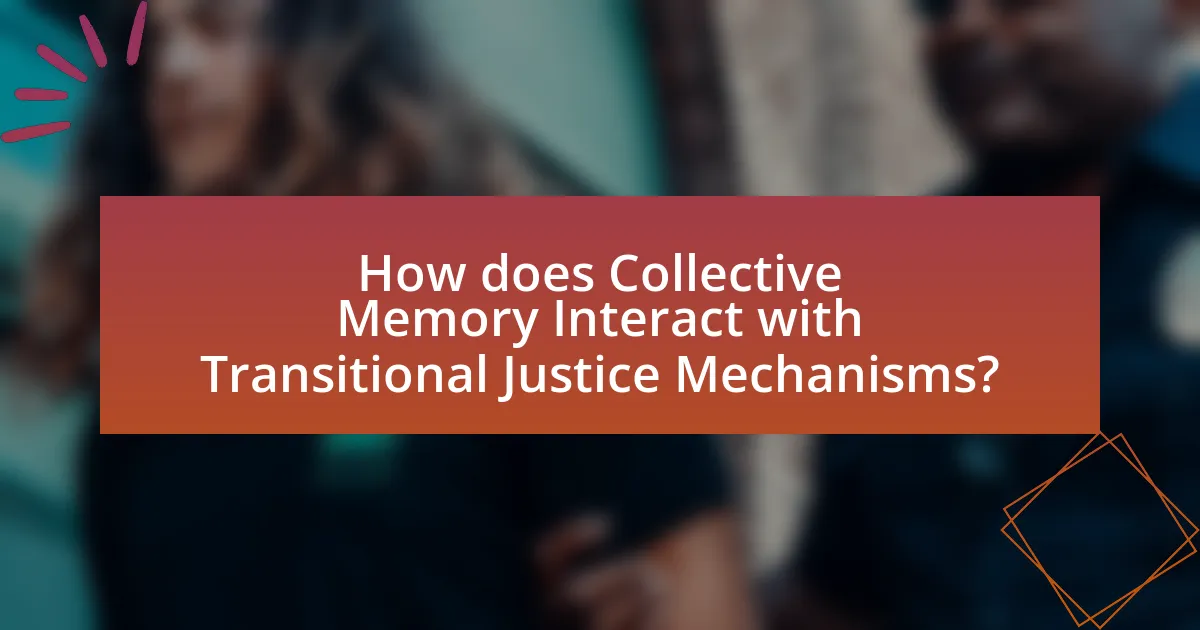
How does Collective Memory Interact with Transitional Justice Mechanisms?
Collective memory interacts with transitional justice mechanisms by influencing public perceptions and narratives surrounding past injustices. This interaction shapes the legitimacy and effectiveness of transitional justice processes, as collective memory can either support or undermine efforts to achieve accountability and reconciliation. For instance, in post-apartheid South Africa, the Truth and Reconciliation Commission utilized collective memory to address historical grievances, fostering a national dialogue about past atrocities. Research indicates that when collective memory aligns with transitional justice initiatives, such as truth-telling and reparations, it enhances societal healing and promotes a shared understanding of history, thereby facilitating more successful outcomes in transitional justice efforts.
What are the different mechanisms of transitional justice?
Transitional justice mechanisms include truth commissions, criminal prosecutions, reparations programs, and institutional reforms. Truth commissions, such as South Africa’s Truth and Reconciliation Commission, aim to uncover past human rights violations and promote healing through public testimony. Criminal prosecutions, like those conducted by the International Criminal Court, hold perpetrators accountable for crimes against humanity. Reparations programs provide compensation to victims, as seen in various countries post-conflict, to acknowledge suffering and restore dignity. Institutional reforms focus on restructuring governmental and legal systems to prevent future abuses, exemplified by reforms in post-dictatorship nations. Each mechanism plays a crucial role in addressing legacies of violence and fostering societal reconciliation.
How do truth commissions utilize collective memory?
Truth commissions utilize collective memory by documenting and acknowledging past human rights violations, which helps to foster national reconciliation and healing. By collecting testimonies from victims and witnesses, truth commissions create a shared narrative that reflects the experiences of diverse groups within society. This process not only validates individual memories but also contributes to a collective understanding of historical injustices, as seen in the South African Truth and Reconciliation Commission, which aimed to address the apartheid era’s atrocities. The establishment of a public record through these commissions serves to educate future generations, ensuring that the lessons learned from the past are not forgotten, thereby reinforcing the importance of collective memory in shaping a just society.
What is the relationship between collective memory and legal accountability?
Collective memory significantly influences legal accountability by shaping societal perceptions of justice and historical narratives. This relationship is evident in transitional justice contexts, where collective memory informs the public’s understanding of past atrocities and the demand for accountability. For instance, in post-apartheid South Africa, the Truth and Reconciliation Commission utilized collective memory to address human rights violations, fostering a societal consensus on accountability measures. Research indicates that societies with a strong collective memory of injustices are more likely to pursue legal accountability, as seen in countries like Argentina, where collective remembrance of the Dirty War has led to ongoing prosecutions of perpetrators. Thus, collective memory serves as a catalyst for legal accountability, driving societal and institutional responses to past wrongs.
How does collective memory impact the effectiveness of transitional justice?
Collective memory significantly impacts the effectiveness of transitional justice by shaping public perceptions and narratives surrounding past injustices. When a society collectively remembers events such as human rights violations, this shared memory influences the demand for accountability and the legitimacy of transitional justice mechanisms. For instance, in post-apartheid South Africa, the Truth and Reconciliation Commission utilized collective memory to address the atrocities of the apartheid era, fostering a national dialogue that contributed to healing and reconciliation. Research indicates that societies with a strong collective memory of injustices are more likely to support and engage with transitional justice processes, as seen in countries like Argentina, where the memory of state terrorism has driven ongoing efforts for justice and reparations. Thus, collective memory serves as a crucial factor in mobilizing societal support for transitional justice initiatives and ensuring their long-term effectiveness.
What are the consequences of ignoring collective memory in transitional justice?
Ignoring collective memory in transitional justice can lead to a failure in achieving genuine reconciliation and healing within a society. When collective memory is overlooked, the narratives and experiences of victims are marginalized, resulting in a lack of acknowledgment of past injustices. This can perpetuate cycles of violence and resentment, as communities feel their suffering is unrecognized and unresolved. For instance, studies have shown that societies that actively engage with collective memory, such as through truth commissions, tend to experience more stable peace and social cohesion compared to those that do not. Therefore, neglecting collective memory undermines the legitimacy of transitional justice processes and can hinder long-term societal recovery.
How can collective memory enhance the healing process for victims?
Collective memory can enhance the healing process for victims by fostering a shared understanding of trauma and validating individual experiences within a community context. This shared remembrance allows victims to feel less isolated, as they recognize that their suffering is acknowledged and understood by others. Research indicates that collective memory can facilitate communal rituals and memorialization efforts, which serve as platforms for storytelling and collective mourning, thereby promoting emotional healing. For instance, studies have shown that communities that engage in collective remembrance activities, such as memorial services or public commemorations, report higher levels of psychological well-being among victims. This process not only honors the past but also helps to build resilience and solidarity among survivors, ultimately contributing to a more cohesive and supportive environment for healing.
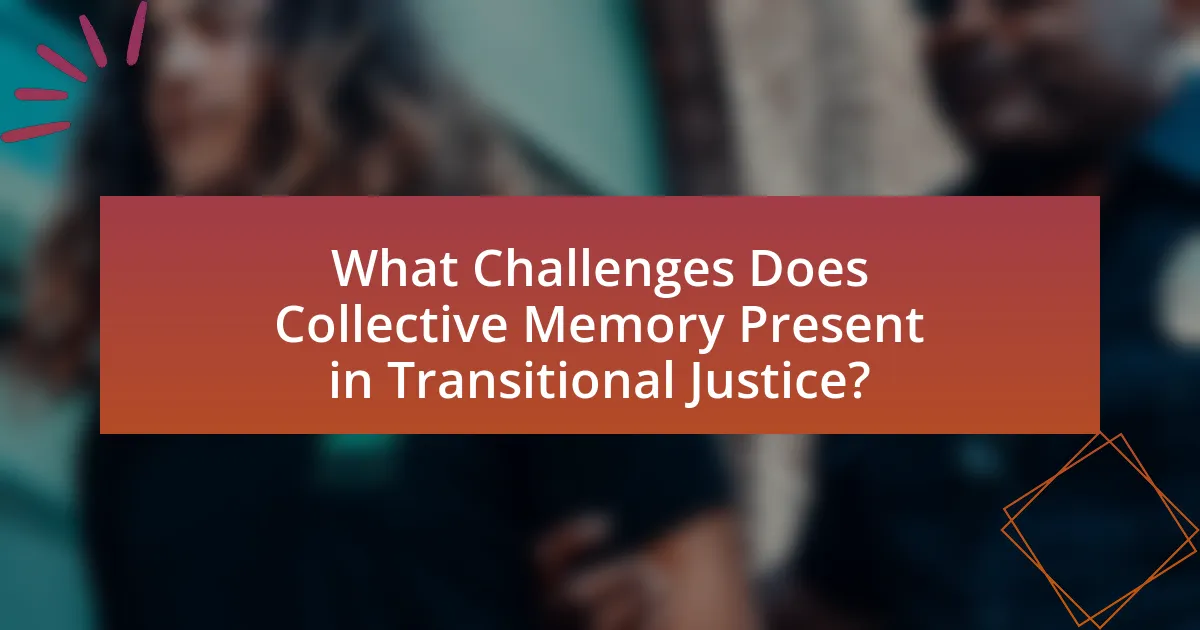
What Challenges Does Collective Memory Present in Transitional Justice?
Collective memory presents significant challenges in transitional justice by influencing narratives and perceptions of past injustices. These challenges include the potential for selective memory, where certain events are emphasized while others are marginalized, leading to incomplete or biased historical accounts. For instance, in post-apartheid South Africa, the Truth and Reconciliation Commission faced difficulties reconciling differing memories of the apartheid era, which affected public trust in the process. Additionally, collective memory can perpetuate divisions within society, as conflicting memories among different groups may hinder reconciliation efforts. This was evident in the Rwandan genocide, where differing recollections of events between Hutus and Tutsis complicated the healing process. Thus, the interplay of collective memory and transitional justice can obstruct the establishment of a unified narrative necessary for societal healing and justice.
What are the potential conflicts arising from differing collective memories?
Differing collective memories can lead to significant conflicts, particularly in contexts of transitional justice. These conflicts often manifest as disputes over historical narratives, where groups may contest the legitimacy of each other’s memories, leading to polarization and social division. For instance, in post-apartheid South Africa, varying recollections of the apartheid era have resulted in tensions between different racial and political groups, complicating reconciliation efforts. Additionally, differing collective memories can hinder the establishment of a shared understanding of past injustices, making it difficult to achieve consensus on reparations or accountability measures. This fragmentation can perpetuate cycles of violence and impede social cohesion, as seen in countries like Rwanda, where divergent memories of the genocide continue to affect inter-ethnic relations.
How can competing narratives hinder transitional justice efforts?
Competing narratives can hinder transitional justice efforts by creating divisions among communities and undermining the legitimacy of the justice process. When different groups promote conflicting accounts of past events, it can lead to a lack of consensus on the facts, making it difficult to establish a shared understanding necessary for reconciliation. For instance, in post-apartheid South Africa, the Truth and Reconciliation Commission faced challenges due to differing narratives about the apartheid era, which complicated efforts to achieve national unity and healing. This fragmentation can result in marginalized voices feeling excluded, further entrenching grievances and obstructing the implementation of justice measures.
What strategies can be employed to address conflicting collective memories?
To address conflicting collective memories, strategies such as inclusive dialogue, historical reconciliation processes, and educational initiatives can be employed. Inclusive dialogue facilitates conversations among different groups, allowing for the sharing of diverse perspectives and fostering mutual understanding. Historical reconciliation processes, such as truth commissions, provide a formal mechanism to acknowledge and document various narratives, helping to validate different experiences. Educational initiatives can promote critical thinking and awareness of multiple historical viewpoints, thereby reducing polarization. These strategies have been supported by research indicating that engaging communities in dialogue and education can lead to more cohesive societies and improved transitional justice outcomes.
How does collective memory evolve over time in relation to transitional justice?
Collective memory evolves over time in relation to transitional justice through processes of reinterpretation, commemoration, and the integration of diverse narratives. As societies confront past injustices, collective memory is shaped by ongoing dialogues about historical events, which can lead to shifts in public perception and understanding. For instance, in post-apartheid South Africa, the Truth and Reconciliation Commission facilitated a platform for victims and perpetrators to share their stories, thereby influencing collective memory and fostering a more nuanced understanding of the past. This evolution is further evidenced by changing memorial practices and educational curricula that reflect new insights and perspectives, demonstrating how collective memory is not static but rather a dynamic construct influenced by societal needs and political contexts.
What factors contribute to the transformation of collective memory?
The transformation of collective memory is influenced by factors such as historical events, cultural narratives, political discourse, and social movements. Historical events, particularly traumatic ones, can reshape collective memory by altering perceptions and interpretations within a community. Cultural narratives, including literature, art, and media, play a crucial role in framing these memories and can either reinforce or challenge existing narratives. Political discourse, especially during transitional justice processes, can significantly impact collective memory by promoting certain interpretations while marginalizing others. Social movements also contribute by advocating for recognition and reinterpretation of past injustices, thereby influencing how collective memory evolves over time.
How can evolving collective memory influence future justice initiatives?
Evolving collective memory can significantly influence future justice initiatives by shaping public perceptions and narratives surrounding historical injustices. As societies reflect on past events, the collective memory can highlight the need for accountability and reconciliation, thereby informing policy decisions and justice frameworks. For instance, in post-apartheid South Africa, the Truth and Reconciliation Commission utilized collective memory to address the atrocities of the past, fostering a national dialogue that influenced subsequent justice initiatives. This demonstrates that as collective memory evolves, it can mobilize communities, guide legislative reforms, and promote restorative justice practices, ultimately impacting the effectiveness and direction of future justice initiatives.
What best practices can enhance the role of collective memory in transitional justice?
Best practices that can enhance the role of collective memory in transitional justice include promoting inclusive narratives, engaging diverse communities, and utilizing multiple mediums for memory preservation. Inclusive narratives ensure that the experiences of all affected groups are represented, fostering a sense of ownership and legitimacy in the transitional justice process. Engaging diverse communities, including marginalized voices, helps to create a more comprehensive understanding of past injustices, which is crucial for healing and reconciliation. Utilizing multiple mediums, such as oral histories, memorials, and digital platforms, allows for broader access and engagement with collective memory, ensuring that it remains relevant and impactful. These practices are supported by case studies from countries like South Africa and Rwanda, where inclusive approaches to memory have contributed to successful transitional justice outcomes.
How can stakeholders effectively engage with collective memory in justice processes?
Stakeholders can effectively engage with collective memory in justice processes by actively incorporating narratives and experiences from affected communities into the design and implementation of justice initiatives. This engagement fosters a sense of ownership and legitimacy, as seen in the Truth and Reconciliation Commission in South Africa, which utilized personal testimonies to shape its findings and recommendations. By prioritizing inclusive dialogue and recognizing diverse perspectives, stakeholders can ensure that collective memory informs policy decisions, thereby enhancing the relevance and impact of justice processes.
What lessons can be learned from successful transitional justice cases regarding collective memory?
Successful transitional justice cases demonstrate that collective memory plays a crucial role in fostering national reconciliation and preventing future conflicts. For instance, South Africa’s Truth and Reconciliation Commission (TRC) effectively utilized collective memory to acknowledge past atrocities, allowing victims to share their experiences, which contributed to a shared understanding of the nation’s history. This approach not only validated individual suffering but also promoted a collective narrative that emphasized healing and unity. Furthermore, the TRC’s public hearings and documentation of testimonies created a historical record that informed future generations, reinforcing the importance of memory in shaping societal values and norms. Such cases illustrate that integrating collective memory into transitional justice processes can enhance legitimacy, promote accountability, and facilitate a more inclusive dialogue about the past.
